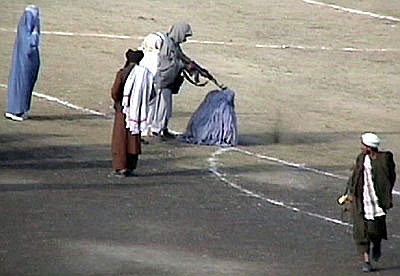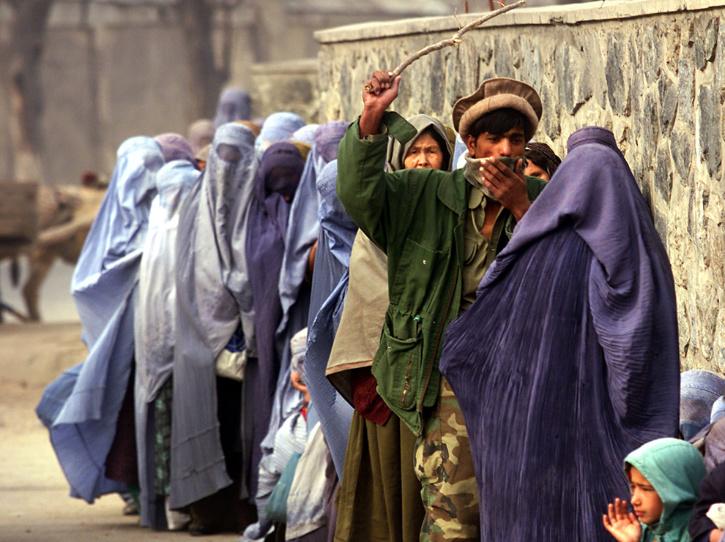The dramatic fall of Kabul without a semblance of resistance from the Afghan government has pithed the progressive ‘modern’ section of Afghan society. Women who have had to historically bear the brunt of the ultra macho misinterpretation of sharia law by the Taliban have been thrown both ends of the rope as soon as the storm started raging. This, after being encouraged to learn to swim in the sea of intellect and egalitarian ideas, making them believe that they had every right to stand tall and pursue the journey to self actualization.
The Afghan women are feeling betrayed and let down by the world community, firstly for making them believe that there were other options than surrendering to the whims of the men in their lives. And secondly, the two decade long period of free thought and basic human rights have spoilt them for good, making it all the more difficult to live under a regime that would make one feel sub-human.
“I’m going to say to the whole world—shame on you!”@SerajMahbouba Afghan women’s rights leader.#Afghanistanpic.twitter.com/LtnhdYpoZB
— Lotte Leicht (@LotteLeicht1) August 15, 2021
Why this fear of Taliban?
The Talibani gender policy during it’s last regime between 1996- 2001 is the worst form of codified gender discrimination that has no parallels in history. Misogyny and violence against women were the trademarks of the regime.
Women over the age of eight years had to follow a strict code of conduct or face the wrath of the mighty Taliban and their Kalashnikovs.
The female apartheid laws were justified by statements by official Taliban spokesmen :
“These laws must be followed to secure an environment where the chastity and dignity of women may once again be sacrosanct”
“the face of a woman is a source of corruption for men not related to them.” [4]
From the age of eight onward, girls were not allowed to be in direct contact with males other than a close “blood relative”, husband, or mahram. (In Islam, a mahram is a member of one’s family with whom marriage would be considered haram (illegal in islam); from whom purdah, or concealment of the body with hijab, is not obligatory)
Moral code of conduct for women
In a systematic segregation sometimes referred to as gender apartheid, women were not allowed to work, they were not allowed to be educated after the age of eight, and until then were permitted only to study the Qur’an.[5]
The code stated that:
- Women should not appear in the streets without a blood relative or without wearing a burqa.
- Women should not wear high-heeled shoes as no man should hear a woman’s footsteps lest it excite him.
- Women must not speak loudly in public as no stranger should hear a woman’s voice.
- All ground and first-floor residential windows should be painted over or screened to prevent women from being visible from the street.
- Photographing, filming and displaying pictures of females in newspapers, books, shops or the home was banned.
- The modification of any place names that included the word “women”. For example, “women’s garden” was renamed “spring garden”.
- Women were forbidden to appear on the balconies of their apartments or houses.
- Ban on women’s presence on radio, television or at public gatherings of any kind.
Implementation of the code
https://feminist.org/our-work/afghan-women-and-girls/the-taliban-afghan-women/
- Banished women from the workforce.
- Closed schools to girls and women and expelled women from universities.
- Prohibited women from leaving their homes unless accompanied by a close male relative.
- Ordered the publicly visible windows of women’s houses painted black and forced women to wear the burqa (or chadari) – which completely shrouds the body, leaving only a small mesh-covered opening through which to see.
- Prohibited women and girls from being examined by male physicians while at the same time prohibited female doctors and nurses from working.
The ‘treatment‘ for deviant behavior.

https://askchange.com/injustice-to-women-rights-in-afghanistan.html
The consequences of disobeying these diktats were always grave. Women were brutally beaten, publicly flogged, and killed for violating Taliban decrees.
- A woman who defied Taliban orders by running a home school for girls was killed in front of her family and friends.
- A woman caught trying to flee Afghanistan with a man not related to her was stoned to death for adultery.
- An elderly woman was brutally beaten with a metal cable until her leg was broken because her ankle was accidentally showing from underneath her burqa.
- Women and girls died of curable ailments because male doctors were not allowed to treat them.
- Two women accused of prostitution were publicly hung.
An Afghan girl named Bibi Aisha was promised to a new family through a tribal method of solving disputes known as baad. When she fled the violence girls often suffer under baad, her new family found her, and a Taliban commander ordered her to be punished as an example, “lest other girls in the village try to do the same thing”.[31] Her ears and nose were cut off and she was left for dead in the mountains, but survived.[31]

In 1999, a mother of seven children was executed in front of 30,000 spectators in Kabul’s Ghazi Sport stadium for murdering her husband (see left). She was imprisoned for three years and extensively tortured prior to the execution, yet she refused to plead her innocence in a bid to protect her daughter (reportedly the actual culprit).
The 2001 defeat of the Taliban liberated all Afghans from a brutal regime. It was especially a pivotal moment for Afghan women and girls from the regime’s draconian decrees. The world witnessed reports of women in Mazar-e-Sharif, Kabul, and other cities going into the streets without male relatives and discarding their burqas–actions that would have garnered brutal punishments under the Taliban.
Dark times ahead for Afghan women
Since the start of 2021, civilian deaths have risen by almost 50 percent with more women and children killed and wounded in Afghanistan than in the first six months of any year since records began in 2009, the UN reported in July.
"if the world forgets about Afghan women now, they'll forget about the next generation of Afghans"
— Masih Alinejad 🏳️ (@AlinejadMasih) August 15, 2021
I interviewed this Afghan artist. She's pleading with the world for help. Millions of Afghan women are heart-broken. Taliban will take them back to dark ages.#Afghan_lives_matter pic.twitter.com/7daowmFxsB
After the fall of the country, numerous reports have emerged of the Taliban going door-to-door, drafting lists of women and girls aged between 12 and 45 years who are then forced to marry Islamist fighters. Women are being told they cannot leave home without a male escort, can no longer work or study or freely choose the clothes they want to wear. Schools, too, are being closed.
The journey of the women of Afghanistan towards a life of dignity and equality was never easy even in an American influenced democratic setup because of the centuries old misogynistic self righteousness hard wired in the male psyche.
However, it is pretty evident now that this reboot of Taliban 2.0 shall prove to be a fatal blow to the dreams of these Afghan women.
The world as a silent bystander shall not be in history’s ‘good books‘. Charged with the crime of doing nothing but feel sorry as the hopes, dreams and aspirations of 14.2 million women are trampled upon, one step at a time.


2 Comments
“Women who have had to historically bear the brunt of the ultra macho misinterpretation of sharia law by the Taliban have been thrown both ends of the rope as soon as the storm started raging.”
Very nicely presented the pen picture of the present scenario.
Well done @Raghujit_Randhawa Ji!
👍
So cruelty in Afganistan on women.
This article sheds light on Afghan women who has no freedom. Infact only restrictions are put on them.
Very aptly presented the plight of women in Afganistan.